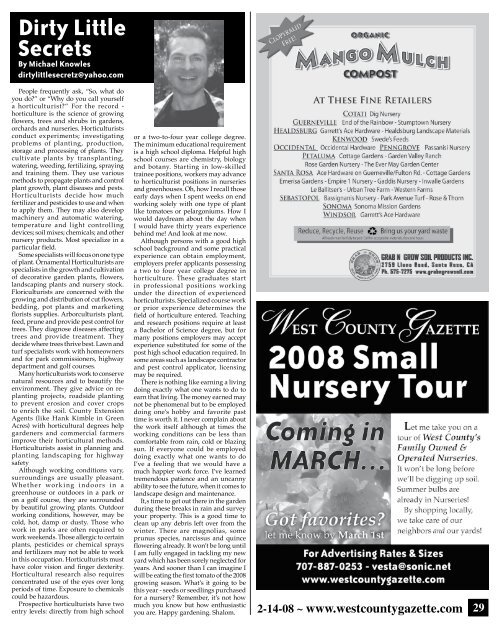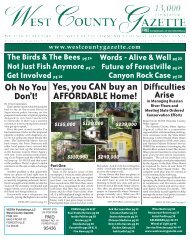Download Entire Newspaper - Sonoma County Gazette
Download Entire Newspaper - Sonoma County Gazette
Download Entire Newspaper - Sonoma County Gazette
- No tags were found...
Create successful ePaper yourself
Turn your PDF publications into a flip-book with our unique Google optimized e-Paper software.
Dirty LittleSecretsBy Michael Knowlesdirtylittlesecretz@yahoo.comPeople frequently ask, “So, what doyou do?” or “Why do you call yourselfa horticulturist?” For the record -horticulture is the science of growingflowers, trees and shrubs in gardens,orchards and nurseries. Horticulturistsconduct experiments; investigatingproblems of planting, production,storage and processing of plants. Theycultivate plants by transplanting,watering, weeding, fertilizing, sprayingand training them. They use variousmethods to propagate plants and controlplant growth, plant diseases and pests.Horticulturists decide how muchfertilizer and pesticides to use and whento apply them. They may also developmachinery and automatic watering,temperature and light controllingdevices; soil mixes; chemicals; and othernursery products. Most specialize in aparticular field.Some specialists will focus on one typeof plant. Ornamental Horticulturists arespecialists in the growth and cultivationof decorative garden plants, flowers,landscaping plants and nursery stock.Floriculturists are concerned with thegrowing and distribution of cut flowers,bedding, pot plants and marketingflorists supplies. Arborculturists plant,feed, prune and provide pest control fortrees. They diagnose diseases affectingtrees and provide treatment. Theydecide where trees thrive best. Lawn andturf specialists work with homeownersand for park commissioners, highwaydepartment and golf courses.Many horticulturists work to conservenatural resources and to beautify theenvironment. They give advice on replantingprojects, roadside plantingto prevent erosion and cover cropsto enrich the soil. <strong>County</strong> ExtensionAgents (like Hank Kimble in GreenAcres) with horticultural degrees helpgardeners and commercial farmersimprove their horticultural methods.Horticulturists assist in planning andplanting landscaping for highwaysafetyAlthough working conditions vary,surroundings are usually pleasant.Whet her work i ng i ndoors i n agreenhouse or outdoors in a park oron a golf course, they are surroundedby beautiful growing plants. Outdoorworking conditions, however, may becold, hot, damp or dusty. Those whowork in parks are often required towork weekends. Those allergic to certainplants, pesticides or chemical spraysand fertilizers may not be able to workin this occupation. Horticulturists musthave color vision and finger dexterity.Horticultural research also requiresconcentrated use of the eyes over longperiods of time. Exposure to chemicalscould be hazardous.Prospective horticulturists have twoentry levels: directly from high schoolor a two-to-four year college degree.The minimum educational requirementis a high school diploma. Helpful highschool courses are chemistry, biologyand botany. Starting in low-skilledtrainee positions, workers may advanceto horticulturist positions in nurseriesand greenhouses. Oh, how I recall thoseearly days when I spent weeks on endworking solely with one type of plantlike tomatoes or pelargoniums. How Iwould daydream about the day whenI would have thirty years experiencebehind me! And look at me now.Although persons with a good highschool background and some practicalexperience can obtain employment,employers prefer applicants possessinga two to four year college degree inhorticulture. These graduates startin professional positions workingunder the direction of experiencedhorticulturists. Specialized course workor prior experience determines thefield of horticulture entered. Teachingand research positions require at leasta Bachelor of Science degree, but formany positions employers may acceptexperience substituted for some of thepost high school education required. Insome areas such as landscape contractorand pest control applicator, licensingmay be required.There is nothing like earning a livingdoing exactly what one wants to do toearn that living. The money earned maynot be phenomenal but to be employeddoing one’s hobby and favorite pasttime is worth it. I never complain aboutthe work itself although at times theworking conditions can be less thancomfortable from rain, cold or blazingsun. If everyone could be employeddoing exactly what one wants to doI’ve a feeling that we would have amuch happier work force. I’ve learnedtremendous patience and an uncannyability to see the future‚ when it comes tolandscape design and maintenance.It‚s time to get out there in the gardenduring these breaks in rain and surveyyour property. This is a good time toclean up any debris left over from thewinter. There are magnolias, someprunus species, narcissus and quinceflowering already. It won’t be long untilI am fully engaged in tackling my newyard which has been sorely neglected foryears. And sooner than I can imagine Iwill be eating the first tomato of the 2008growing season. What’s it going to bethis year - seeds or seedlings purchasedfor a nursery? Remember, it’s not howmuch you know but how enthusiasticyou are. Happy gardening. Shalom.2-14-08 ~ www.westcountygazette.com29
















